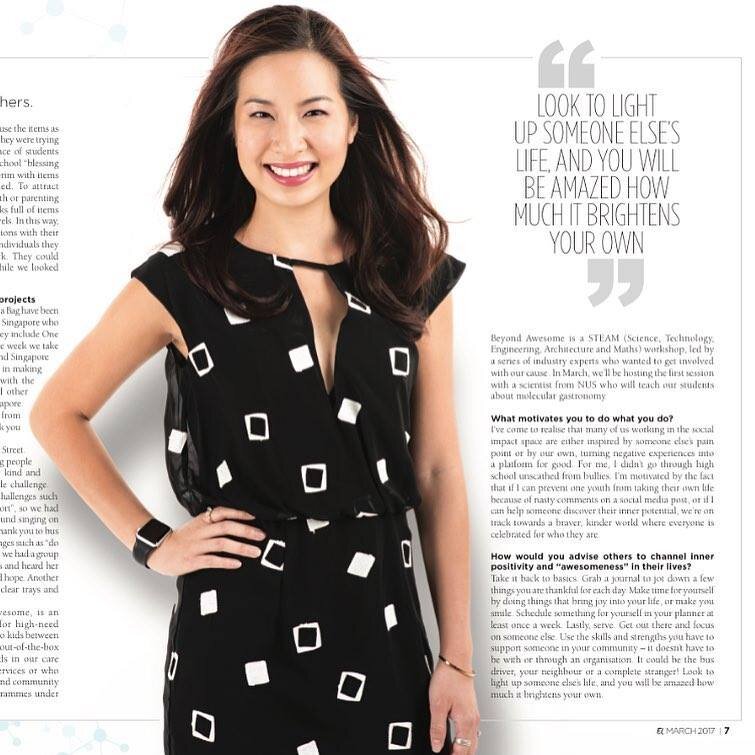
Press Clippings









SINGAPORE — The memory of seeing less privileged street children in Jakarta, Indonesia while riding the school bus as a seven year-old international school student led Ms Emily Teng to channel blessings others’ way.
“I used to ask my mum, why is there such a huge disparity between us and the young children on the street?” said Ms Teng, 31, a former radio deejay.
The Gen.T List 2019 Is Live: Meet This Year's 50 Singapore Honourees
Get to know the people in Singapore who are shaping Asia's future
For the very first time in its history, the Gen.T List for 2019 is a regional list of 400 individuals across the region who are shaping Asia's future. Of the 400 honourees from multiple industries including sports, finance, technology, media, the arts and more, we're proud to announce that 50 of them are from Singapore.
Former radio presenter Emily is the founder of Blessings in a Bag, a volunteer-powered nonprofit that collects used clothing, household goods, hygiene products and school supplies, and delivers them to partner social service organisations in Indonesia, Cambodia and the Philippines to help communities in need. The organisation also organises weekly learning programmes for under-resourced youths in Singapore. In 2018 she received the President’s Volunteerism & Philanthropy Award in the Kampong Spirit category.
The Gen.T List 2019 was officially unveiled on Wednesday at Kilo Kitchen and Kilo Lounge, celebrating a new wave of 400 young leaders in Asia, of which 50 are from Singapore. If you missed out on the party, here is a lowdown on the happenings of that evening
Her face and voice may be familiar to many radio listeners in Singapore but 26-year-old Emily Teng is also the founder of local social enterprise Blessings In A Bag. We speak with the exuberant individual on how she got started on this road.
Team lunches and ping-pong tables are great, but they don't lower stress levels. Here are six ways you can promote a culture of wellness and decrease productivity-sapping stress levels in your workplace.
As founders expand their organisations to other markets, leading a team without physically being in the country with them can be a challenge.
For Emily Teng, who has been remotely running her Singapore-based non-profit organisation Blessings in a Bag from San Francisco since she moved there with her husband in 2019, extra effort has to be made to stay connected with her team digitally. “I’m very intentional about asking how my team is first rather than the work that they’ve done,” she says.
“At our monthly ‘team huddles’, we have a self-check-in portion where everyone can share about their happiness levels, how they’re feeling and what they need support with professionally or personally.
It's important to know how we can relate to each other as humans—to have compassion and empathy. We should take time to build relationships, and not focus on what we stand to gain from them. If you don't take this time to find out where people's hearts and minds are at, it will be challenging to identify or coach them to tap on their strengths.
I’ve also personally found this quote by American researcher and author Brené Brown to be very helpful in guiding me as a leader: ‘Clear is kind. Unclear is unkind.’ To me, it suggests that one should lead with courage and authenticity, and to be clear about everything one does.”
A young girl finds her passion collecting clothes and toys for the needy. By Candice Neo (Author). 15 November 2011
What started with a simple Christmas project has blossomed into a substantial initiative that extends to many underprivileged children in Asia. Emily Teng of Blessings in a Bag (BIAB) – a non-profit initiative that works with communities, orphanages and homes regionally – had originally wanted to inspire her friends to give back to the community during the festive season.
She felt that many of her friends focused too much on the “material things” in their lives, and wanted to get them to start thinking about “causes that were greater than that”. In the months leading up to Christmas 2007, Emily requested donations of unwanted (but still usable and relatively new) clothes from her peers on Facebook and MySpace, with the intention of shipping the items to needy communities in Asia.
Two weeks later, she was met with an overwhelming response. “People were just dropping things off at my home lobby … and my wardrobe was flooded with items,” said the 24-year-old. The donations even spilled into her living room! At that time, she never thought twice about the costs that her project could incur; she was more focused on reaching the goal of helping the children.
Her first shipment of about five boxes to charity in the Philippines, Tiwala Kids and Communities, came to S$200. How it works Today, equipped with a formal NGO, a team of five other volunteer youths and, albeit, a lot more savvier, Emily is still collecting and packing clothes, toys and stationery for children in Cambodia, Philippines and other countries in Southeast Asia. She has set up collection points at *Scape Youth Park and other locations that she advertises through the BIAB Facebook page.
To distribute the items, the BIAB movement encourages people to bring donations in their luggage when they travel to countries with selected charity groups. These charities are either recommended by volunteers, or those that Emily has personally visited, or have kept in touch with over the years. In return, the volunteers have to take photos of their interactions with the community with which they leave the donations.
Emily also works with corporations – including the TUV SUD, a service provider of product testing services, and Singapore Airlines 5Cs – to supply donations as well as to distribute goods overseas. For the most part, however, she pays for the shipping expenses out of her own pocket – using her salary from her full-time job as a DJ at Power 98 FM – as well as occasional financial support from her teammates, friends and family members. These expenses vary from month to month, depending on the amount of donations received and requests from the different non-profits, but can cost anywhere from S$200 to S$5,000.
Distribution still remains BIAB’s largest cost. Beyond her own expenses, Emily also puts in a lot of her own personal time into BIAB. On an average, she spends around four to five hours a day on her cause and finds balancing her work as a DJ and BIAB challenging. “You just have to prioritise your time especially on things that you care about,” she said.
Besides children, Emily also reaches out to impoverished women. She is currently working with OKRA, a project that enables women from rural locations in Cambodia and Philippines to earn an income by hand-making stuffed toys and colourful bags using recyclable materials. Emily buys the products from them and sells them in shops in Singapore including Friends at Haji Lane and Wood Wood at Far East Plaza. She also sells the products at various events that BIAB volunteers attend. For each of the items, the women can earn around US$8 (S$10.34) to US$10 ($12.93).
Besides just children
In 2007, Emily launched the OKRA initiative after a trip to the Philippines during which she noticed women collecting trash to make and sell various items in their rural communities. “The products were still seen as trash and no one was buying them,” she said. She decided to teach the women to improve their products and hence, started up the OKRA project. She now works with six groups of women consisting of eight to 10 women each group.
Having empathy for the needy
Despite having come from a well-to-do family in Jakarta, Emily has long had an affinity to help the needy. She first realised the importance of giving back to society – to the needy – when she was eight. She was already conscious of the underprivileged; she was confronted with scenes of slums and children on the streets whenever her family drove out of their wealthy neighbourhood in Jakarta. But one particular incident left an impression on her. She recalls the day when her mother suddenly told her to pack her old clothes and toys and, together, they brought the items to their housekeeper’s residence in the slum area.
“I still remember her daughter was the same age as I was, but she had nothing, and was just playing with dirt,” Emily remembers. With that image imprinted in her mind, Emily naturally became an active giver. Over the years, she has been a volunteer at retiree homes, a hospice, and childcare centres. She hopes that in addition to her giving and her work with BIAB, she can inspire other youths to volunteer and contribute back to society. “It’s important that they know they can make a difference, and they get to know their own strength and how they can help people,” she said. “They just need to donate what they have – time, passion, and a heart willing to help out.”
She is also in the midst of starting yet another BIAB initiative – Project WorldChangeAgent, which aims to encourage secondary school students to develop ideas to solve real-world problems today. The winning teams, which will be selected in August 2012, would get an all-expense-paid trip to the country on which they are working to carry out their ideas. The BIAB team is currently looking for sponsors for this project. I
t is two months before Christmas and Emily is busy again with donated items including toys that need to get shipped out before year-end and the many projects on which she is working. What keeps her going is the thought that one of those toys will light up a child’s face and the bedclothes will keep a family warm. These are her blessings to the world.
This story was first published on SALT , an e-magazine by the National Volunteer & Philanthropy Centre. Additional info provided by cataloguer: The article is accompanied by two photographs consisting of Emily Teng packing donations and Emily together with some street kids in Philippines
This article was first published in The Straits Times on 1 Nov, 2008. By Tan Weizhen
FOR years, Ms Emily Teng saw family and friends head overseas for trips with empty space in their bags. Many were travelling to developing countries, such as Thailand and the Philippines, where children are in desperate need of clothes and other amenities.
So, the 21-year-old Ms Teng came up with a novel idea. She could get shirts, textbooks and toys to the underprivileged children by having these travellers stow the gear in their luggage.
'(People) are heading overseas anyway, with space in their luggage...so why not make full use of it?' the college student stated.
Last year, the brainwave led to the creation of Blessings in a Bag.
Ms Teng now has arrangements with orphanages in the Philippines and Thailand where Singaporean travellers can drop off the donated items.
When there are no travellers, Ms Teng ships the gear to the orphanages. But shipping costs are steep, and so far she has spent about $5,000 of her own money on freight and other logistics.
Still, she feels compelled to help the kids.
'Many of the children are orphaned, abused, sold for money, or abandoned as their parents head for divorce. That's why I wish to clothe them, or give them toys and books so they can have as normal a childhood as possible.'
The clothes have gone to more than 100 children in two orphanages, as well as those in poor communities.
To save money, Ms Teng does most of the work herself and uses social networks - Facebook and MySpace - to publicise her cause.
Word of her work spread quickly, and people donate up to 100kg worth of goodies each week. She even has the clothes laundered before sending them abroad.
'Many of the orphanages have no clean water to wash with, so I make sure the clothes arrive already clean.'
She spends at least two days a week sorting and packing donations, sometimes with help from her family.
'It's tedious and lengthy work which I spend almost 24 hours obsessing about. But I have committed myself. It's not something I can just give up halfway.'
Blessings in a Bag depends on donations. People can drop off old clothes, books and games at Comics Mart at Serene Centre, Farrer Road.
Travellers can pick up the gear there or contact Ms Teng directly.
When they arrive at their overseas destinations, they can drop off the bags at designated spots.
The Comics Mart owners have agreed to let Ms Teng use their premises not only as a drop-off point, but also for sorting and packing the donations.
But Ms Teng does not just organise from afar. She is also travelling to the Philippines with friends to build homes for needy children.







